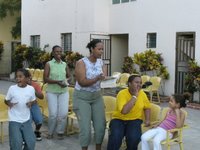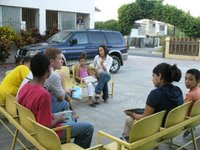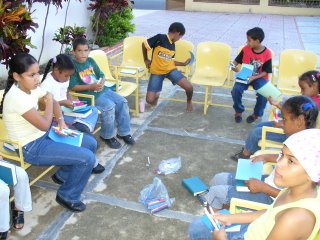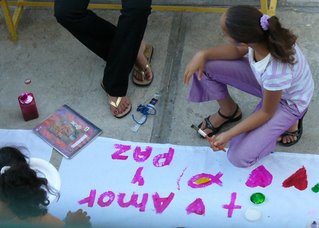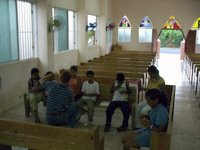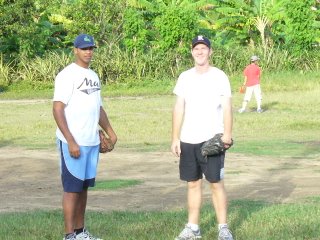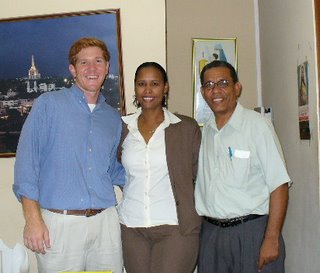Several months ago I wrote about how God manifests himself in so many different ways, as evidenced by worshiping in a different culture and language. This realization also helps us pull God out of our neat, comfortable boxes. (Episcopalians NEVER do that, right???)
Now I see God manifested in a much deeper and controversial way here: in the poor and the economic struggles that the Dom. Rep. faces. “How can God exist in such a torn, unbalanced world?” many ask. It is unbalanced, true, but in what direction? On more than one occasion, I have thought that the poverty-stricken people here, who earn $12 a day, have more than I do.
Yes, that’s a bold statement to say, and perhaps sounds a little naïve. But I have never, NEVER met people with more inner peace and easy-going manners. Even living with them for a year, it is still a struggle for me to slow down and just ‘be’ with them. I look at the expensive houses in Gurabo, a wealthy neighborhood I visit here, and see 10ft fences topped with broken glass and barbed wire where people never visit with one another, never sit outside and chat, and don’t know their neighbors. (Sounds a lot like suburban USA, doesn’t it?). Then I look at Tigaiga, the ‘poor’ neighborhood I visit, with no fences, children chasing (or being chased, as the case may be, by) chickens and their neighborhood friends, and a smile and a wave waiting for every passerby. I have been invited to meals by 4 families of Tigaiga and one of Gurabo. The woman of Mark 12:44 who put her 2 copper coins in the church treasury comes to mind.
Additionally, I received several positive responses to #4 on my list of Top 5 DR lessons letter that read: A mindset of intellectual superiority is the fastest way to become stupid. Despite all of the education we go through in the States, the money we pay for it, the time we spend studying the Bible, our questions are the same. Let me share some of the questions I have gotten in my Bible study:
· If God was here in Jesus, but Jesus left, and then the Holy Spirit came, how can all of these, and the Father be One God?
· How can the end of the world come if God promised Noah He would never destroy man-kind again so long as the Earth existed?
· What happens to the already dead when Christ comes again?
· What happened to those who came before Christ came?
These are, for the most part, questions that are still (and probably ALWAYS be hotly debated in the theological world, experts, highly educated, trained, etc writing extensive works on their interpretations.) Yet, I get the same questions from people who have no more than a 6th grade education, and who, honestly, come up with a lot of the same offered answers that books have.
I have to tell you, their faith that every next day there will be enough money for food and that they won’t get into an accident on the street that will take all of their money is incredible. But if that does happen, their neighbors and their families help them out. A family’s house burned completely, and friends of the family have allowed them to stay (all 5 of them) in their modest apartment for more than 4 months now while the house is being rebuilt. The host of our weekly Bible study had his life savings of 700 pesos ($21USD) stolen, and yet we met like usual that night, prayed together, and he just kept going. I don’t have to worry about my food for the next day. Instead, I worry if I’ll get into the best med school, or if I’ll have internet today to see the latest Dilbert cartoon (not necessarily in that order either… :-)
There’s so much less clutter in their lives that they focus on what’s most important, and that’s getting through this life now, and getting ready for the next life in front of them. They’ve accepted that they will never own a car, sleep in an airconditioned room, or be like the people they see on TV. Our US culture makes them look like ‘slackers’ who have given up, but to the contrary: they have a PEACE that is unlike that I’ve ever seen before and that starkly contrasts with what I’ve seen in the less fortunate in the US, who are, essentially, oppressed by the culture. (I am making no political comments with this, and I still don’t believe that throwing money at the less fortunate in and of itself is the answer—I am simply pointing out my observations.)
They are closer to the aspects of life that most directly affect it and are therefore more able to connect with God in relating Him to their lives. Why is it so much easier to see God in nature than a city if He essentially made everything we see in both places (trees in the forest, the metals that make our cars, etc). I think it’s largely because in nature, the things He made are seen more in their original form, and I believe the same applies to how we live our lives.
I’m returning to the chaos soon, and the question is: how am I going to not let LIFE get in the way of my relationship with God? I ask you the same question. And I’m ALL EARS for thoughts…
Praying that this has left you thinking,
Andrew
